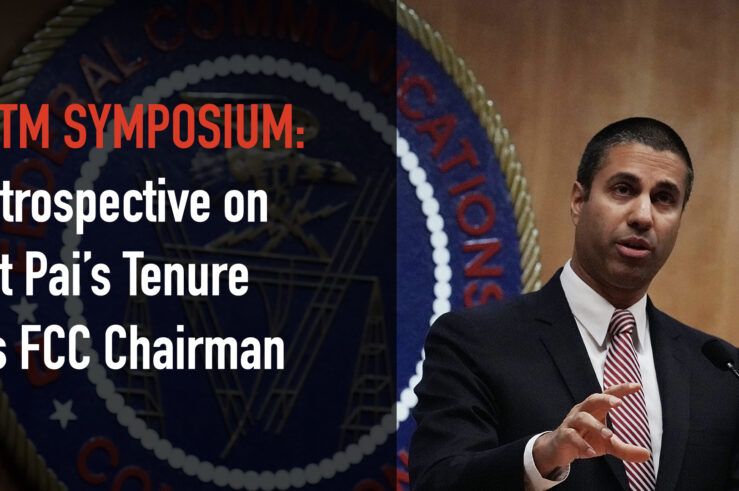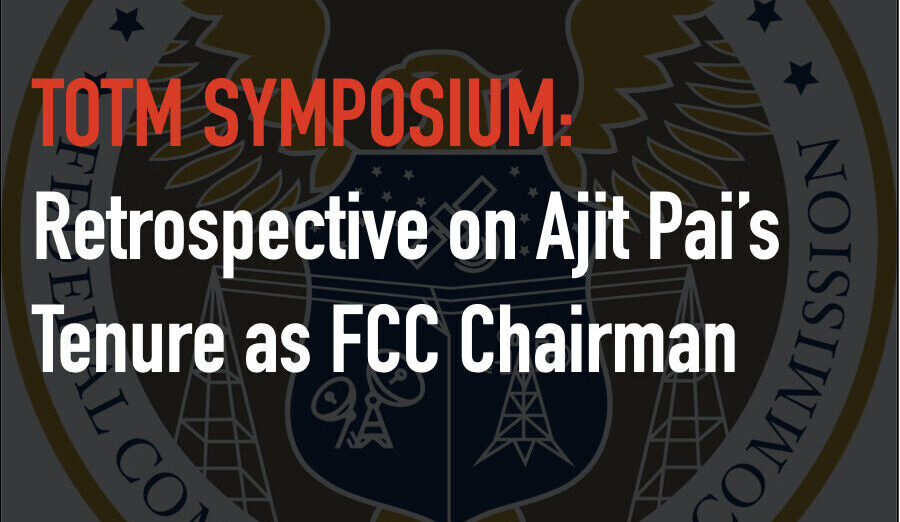
This article is a part of the Retrospective on Ajit Pai's Tenure as FCC Chairman symposium.

One significant aspect of Chairman Ajit Pai’s legacy is not a policy change, but an organizational one: establishment of the Federal Communications Commission’s (FCC’s) Office of Economics and Analytics (OEA) in 2018.
Prior to OEA, most of the FCC’s economists were assigned to the various policy bureaus, such as Wireless, Wireline Competition, Public Safety, Media, and International. Each of these bureaus had its own chief economist, but the rank-and-file economists reported to the managers who ran the bureaus – usually attorneys who also developed policy and wrote regulations. In the words of former FCC Chief Economist Thomas Hazlett, the FCC had “no location anywhere in the organizational structure devoted primarily to economic analysis.”
Establishment of OEA involved four significant changes. First, most of the FCC’s economists (along with data strategists and auction specialists) are now grouped together into an organization separate from the policy bureaus, and they are managed by other economists. Second, the FCC rules establishing the new office tasked OEA with reviewing every rulemaking, reviewing every other item with economic content that comes before the commission for a vote, and preparing a full benefit-cost analysis for any regulation with $100 million or more in annual economic impact. Third, a joint memo from the FCC’s Office of General Counsel and OEA specifies that economists are to be involved in the early stages of all rulemakings. Fourth, the memo also indicates that FCC regulatory analysis should follow the principles articulated in Executive Order 12866 and Office of Management and Budget Circular A-4 (while specifying that the FCC, as an independent agency, is not bound by the executive order).
While this structure for managing economists was new for the FCC, it is hardly uncommon in federal regulatory agencies. Numerous independent agencies that deal with economic regulation house their economists in a separate bureau or office, including the Securities and Exchange Commission, the Commodity Futures Trading Commission, the Surface Transportation Board, the Office of Comptroller of the Currency, and the Federal Trade Commission. The SEC displays even more parallels with the FCC. A guidance memo adopted in 2012 by the SEC’s Office of General Counsel and Division of Risk, Strategy and Financial Innovation (the name of the division where economists and other analysts were located) specifies that economists are to be involved in the early stages of all rulemakings and articulates best analytical practices based on Executive Order 12866 and Circular A-4.
A separate economics office offers several advantages over the FCC’s prior approach. It gives the economists greater freedom to offer frank advice, enables them to conduct higher-quality analysis more consistent with the norms of their profession, and may ultimately make it easier to uphold FCC rules that are challenged in court.
Independence. When I served as chief economist at the FCC in 2017-2018, I gathered from conversations that the most common practice in the past was for attorneys who wrote rules to turn to economists for supporting analysis after key decisions had already been made. This was not always the process, but it often occurred. The internal working group of senior FCC career staff who drafted the plan for OEA reached similar conclusions. After the establishment of OEA, an FCC economist I interviewed noted how his role had changed: “My job used to be to support the policy decisions made in the chairman’s office. Now I’m much freer to speak my own mind.”
Ensuring economists’ independence is not a problem unique to the FCC. In a 2017 study, Stuart Shapiro found that most of the high-level economists he interviewed who worked on regulatory impact analyses in federal agencies perceive that economists can be more objective if they are located outside the program office that develops the regulations they are analyzing. As one put it, “It’s very difficult to conduct a BCA [benefit-cost analysis] if our boss wrote what you are analyzing.” Interviews with senior economists and non-economists who work on regulation that I conducted for an Administrative Conference of the United States project in 2019 revealed similar conclusions across federal agencies. Economists located in organizations separate from the program office said that structure gave them greater independence and ability to develop better analytical methodologies. On the other hand, economists located in program offices said they experienced or knew of instances where they were pressured or told to produce an analysis with the results decision-makers wanted.
The FTC provides an informative case study. From 1955-1961, many of the FTC’s economists reported to the attorneys who conducted antitrust cases; in 1961, they were moved into a separate Bureau of Economics. Fritz Mueller, the FTC chief economist responsible for moving the antitrust economists back into the Bureau of Economics, noted that they were originally placed under the antitrust attorneys because the attorneys wanted more control over the economic analysis. A 2015 evaluation by the FTC’s Inspector General concluded that the Bureau of Economics’ existence as a separate organization improves its ability to offer “unbiased and sound economic analysis to support decision-making.”
Higher-quality analysis. An issue closely related to economists’ independence is the quality of the economic analysis. Executive branch regulatory economists interviewed by Richard Williams expressed concern that the economic analysis was more likely to be changed to support decisions when the economists are located in the program office that writes the regulations. More generally, a study that Catherine Konieczny and I conducted while we were at the FCC found that executive branch agencies are more likely to produce higher-quality regulatory impact analyses if the economists responsible for the analysis are in an independent economics office rather than the program office.
Upholding regulations in court. In Michigan v. EPA, the Supreme Court held that it is unreasonable for agencies to refuse to consider regulatory costs if the authorizing statute does not prohibit them from doing so. This precedent will likely increase judicial expectations that agencies will consider economic issues when they issue regulations. The FCC’s OGC-OEA memo cites examples of cases where the quality of the FCC’s economic analysis either helped or harmed the commission’s ability to survive legal challenge under the Administrative Procedure Act’s “arbitrary and capricious” standard. More systematically, a recent Regulatory Studies Center working paper finds that a higher-quality economic analysis accompanying a regulation reduces the likelihood that courts will strike down the regulation, provided that the agency explains how it used the analysis in decisions.
Two potential disadvantages of a separate economics office are that it may make the economists easier to ignore (what former FCC Chief Economist Tim Brennan calls the “Siberia effect”) and may lead the economists to produce research that is less relevant to the practical policy concerns of the policymaking bureaus. The FCC’s reorganization plan took these disadvantages seriously.
To ensure that the ultimate decision-makers—the commissioners—have access to the economists’ analysis and recommendations, the rules establishing the office give OEA explicit responsibility for reviewing all items with economic content that come before the commission. Each item is accompanied by a cover memo that indicates whether OEA believes there are any significant issues, and whether they have been dealt with adequately. To ensure that economists and policy bureaus work together from the outset of regulatory initiatives, the OGC-OEA memo instructs:
Bureaus and Offices should, to the extent practicable, coordinate with OEA in the early stages of all Commission-level and major Bureau-level proceedings that are likely to draw scrutiny due to their economic impact. Such coordination will help promote productive communication and avoid delays from the need to incorporate additional analysis or other content late in the drafting process. In the earliest stages of the rulemaking process, economists and related staff will work with programmatic staff to help frame key questions, which may include drafting options memos with the lead Bureau or Office.
While presiding over his final commission meeting on Jan. 13, Pai commented, “It’s second nature now for all of us to ask, ‘What do the economists think?’” The real test of this institutional innovation will be whether that practice continues under a new chair in the next administration.




